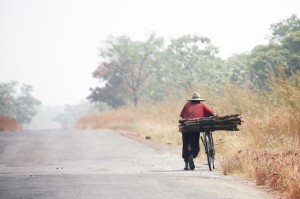Shriver launched a Peace Corps that broadened Americans' lives
Although it's been more than two decades, I remember very clearly how nervous I was before stepping out onto the streets of Togo, West Africa, as a newly minted Peace Corps volunteer.
At dinner during our first night in the wet sub-Saharan country, we 40-some volunteers were dining on avocado halves when the lights went out. As our hosts worked to start the backup electrical generator, the sudden darkness jarred me into thinking how far out of my element I was. What if the Togolese were nothing like the people I had known back in my insular, white Massachusetts suburb? What if they were completely alien? I felt a little panicky.
But the lights came back on. I picked at my avocado, and the following day I began a journey - making many good Togolese friends and learning valuable lessons about the universality of human frustrations, dreams and endurance.
Sargent Shriver, the man whose leadership made that journey possible for me and more than 200,000 other Americans, died Tuesday at 95.
President John F. Kennedy launched the organization in 1961, as a way of introducing Americans to the rest of the world. He thought that our reputation abroad was "ugly" and arrogant. In his inaugural address, given 50 years ago today, Kennedy reminded us that we were in the historic position of being able to abolish all poverty or abolish all life.
"To those peoples in the huts and villages across the globe struggling to break the bonds of mass misery, we pledge our best efforts to help them help themselves, for whatever period is required," Kennedy said. "If a free society cannot help the many who are poor, it cannot save the few who are rich."
Shriver, a former Kennedy family employee married to the president's sister, Eunice, was named the Peace Corps' first director. The organization helped Americans grow from our insular 1961 world into the globally engaged nation we are today. The Peace Corps took us by the hand on that adventure. It provided a way to see the world for middle-class people - those who could afford to take a couple of years away from establishing their careers, but wouldn't necessarily be able to travel otherwise. It was an outlet for the tumult of the 1960s, growing quickly to 15,000 volunteers serving in more than 44 countries by 1966.
In the 1980s, President Ronald Reagan first cut, then expanded the Peace Corps. The organization has been embraced by Democrats and Republicans alike, with George W. Bush and Barack Obama among its strongest supporters.
Shriver could have settled for Kennedy's original vision of sending some nice, young Americans abroad to charm the Third World. But he insisted on technical skills from the Peace Corps' early days. And he extracted a pledge from every volunteer to not only help host countries meet their needs for trained men and women, but to return to the United States to, in turn, bring the world to Americans.
Former Mali volunteer Anne Kopstein of Huntington takes photos to classrooms and community groups to talk about her experiences. Claudia Hart, who became a teacher in Connecticut, has devoted a corner of her home to Zaire, which her students visit. David Olson, another Togo volunteer, advocates on behalf of global health issues in Washington.
As Sargent Shriver departs for his next assignment, it's worth noting how many lives he touched by seeing the Peace Corps off to a sound beginning: generations of volunteers, their co-workers and friends around the world, and the people at home who are curious to hear our stories.
He made our world larger, just when the globe was shrinking.
Originally published in Newsday
